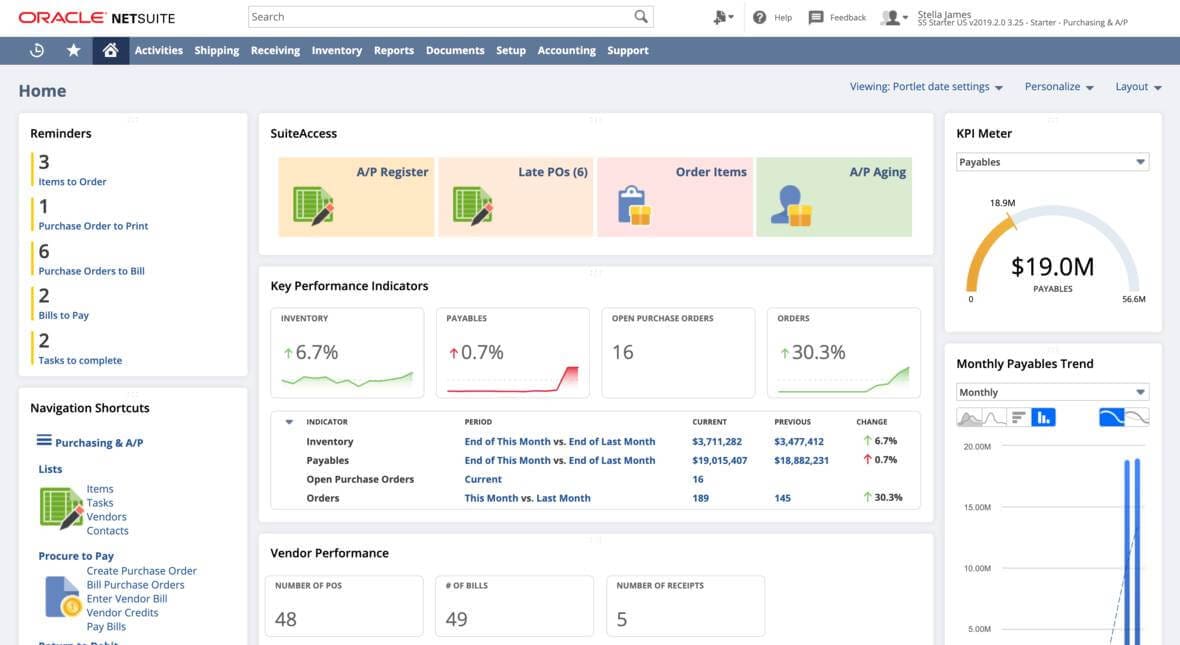There are a few reasons you might be comparing NetSuite and Epicor: You could be choosing your first ERP system, or maybe you’re using Epicor already but want to move to a cutting-edge system with far more capabilities.
In this article, we’ll compare NetSuite vs. Epicor to help you make the best decision.
What Is ERP?
An enterprise resource planning (ERP) system connects your core business processes, from accounting to inventory management, customer relationship management (CRM), and beyond. The software collects information from across departments into a central database for better reporting and collaboration. The best cloud-based ERP systems also automate processes and have business intelligence tools that offer rich insights into your business’s performance.
NetSuite vs. Epicor: An Overview
NetSuite was built in the cloud with a suite of tightly integrated functionalities that can equip your company to confidently change and grow, no matter the industry. By contrast, Epicor is newer to the cloud game, offering disjointed ERP aimed at specific industries. NetSuite’s methodology - called SuiteSuccess - is a total solution in a single system. It gets you up and running quickly and is built on leading practices developed from thousands of implementations. KPIs, workflows, reports, and value-driven dashboards meet the day-to-day and strategic needs of all key roles within your company — from Day 1.
NetSuite
NetSuite’s cloud-based ERP system uses a common data repository that supports finance, supply chain, professional services automation (PSA), CRM, HR, and other critical functions without requiring integration between and maintenance of ERP modules. In other words, it works the way you’d expect an ERP system to work, no matter how much your business changes.
Epicor
Epicor started overhauling all three main Epicor Software products in 2015 and did not finish until 2019, according to their CEO. Thus, many of its customers still run on-premises ERP systems. Epicor tends to add functionality through partner solutions or add-on modules that require integrations.
Product Maturity and History
NetSuite launched in 1998 as a web-hosted accounting software called NetLedger. It was founded by Evan Goldberg with backing from Oracle Chairman Larry Ellison. About five years later, the product became NetSuite ERP. NetSuite went public in 2007.
Epicor started in 1984 as Platinum Software Corporation, an accounting software company. Platinum went public in 1992, acquired other software businesses, and changed its name to Epicor in 1999.
Acquisitions by Oracle and PE Firms
NetSuite was acquired by Oracle in 2016 for $9.3 billion. This gave the company access to Oracle’s immense resources.
Epicor has been sold or acquired three times in the past 12 years, most recently in 2020 by private equity firm Clayton, Dubilier & Rice — which notably uses NetSuite to run its business. Epicor has largely built its product offerings through acquisition versus developing its own products. It has acquired at least 21 individual software products over the years, and additional products came via its 2011 merger with Activant.
NetSuite vs. Epicor
In addition to a singular focus on a cloud-based solution, NetSuite has key features that Epicor doesn’t.
Epicor lacks native CRM, ecommerce, and tax management features compared to NetSuite, which was created as an “all-in-one” solution that can manage all those functions.
Many existing Epicor customers are using Microsoft SQL Server Reporting Services (SSRS) or SAP Crystal Reports. Meanwhile, NetSuite comes with hundreds of reports and dashboards for real-time insights on your business. You can build new and change included reports in NetSuite with clicks, not code.
More details on the difference between NetSuite vs. Epicor:
| NetSuite | Epicor | |
|---|---|---|
| OVERVIEW | ||
| Customers | 21,000* | |
| Countries | 150* | |
| Platforms Offered | 1 | 11 |
| KEY FEATURES** | ||
| Accounts Payable | ||
| Accounts Receivable | ||
| Financial Management | ||
| Inventory Management | ||
| Customer Relationship Management (CRM) | ||
| Omnichannel Commerce | ||
| Payroll |
*According to 2022 data from Epicor’s website
**Native to the ERP; not requiring different technology or separate databases
Implementation Considerations
Several customers with prior experience with Epicor have mentioned heavy implementation lifts and additional costs due to adjusted timelines and little out of the box products. Most NetSuite implementations are fixed-bid with NetSuite SuiteSuccess, a staged approach that allows your team to go live quickly with out-of-the-box process flows, dashboards, KPIs, and other features tailored specifically to your industry.
Database and Architecture Considerations
Many of the Epicor modules offered today were acquired solutions not built natively on Epicor’s ERP platforms, or are solutions “powered by” 3rd party vendors. These modules then require integration and can create a more complex system. Common with legacy on-premise and hosted cloud solutions, companies can experience delayed or painful product upgrades and costly and cumbersome integrations or customizations.
NetSuite focuses its development resources on just one multi-tenant cloud platform. As a SaaS offering, all customers run on the same version of NetSuite thanks to automatic upgrades, and customizations carry over with each upgrade. NetSuite acquisitions (e.g.Verenia CPQ, Next Technik FSM, TribeHR HCM, etc.) are suite development partners built natively on the NetSuite platform, not requiring additional integration.
Platform and Integration Capabilities
Epicor’s platforms are narrowly focused: For example, Epicor Kinetic (formerly Epicor ERP) targets manufacturing, not distribution or retail. If your manufacturing business runs Epicor and wants to enter the retail and/or ecommerce space, for example, you’ll likely need to implement a separate Epicor product.
NetSuite's platform allows you to easily add functionality for more industries and sales channels. For example, when Epicor’s limitations prevented distributor E-Z LOK from launching an ecommerce channel, E-Z LOK switched to NetSuite. It now runs a sleek ecommerce site and fulfills orders faster than it did with Epicor.
NetSuite also makes it simple to add and manage local and international subsidiaries with real-time and automatic financial consolidations. Consolidations in Epicor require a submodule at an extra cost, as well as manual work.
Partners and Ecosystems
Epicor has a comparatively small independent software vendor (ISV) partner network, so customers usually create custom integrations to outside tools.
NetSuite has a broad ecosystem of partners that have extended the platform’s value, with over 600 applications available in the SuiteApp(opens in a new tab) marketplace.
Support Services
In addition to phone and online support, NetSuite has a searchable SuiteAnswers knowledge center and NetSuite Support Community(opens in a new tab) that includes some 48,000 users. For customers that want to proactively optimize their solution with a team of experts, it offers NetSuite Advanced Customer Support (ACS).
Epicor’s EpicCare support offering, which comes standard, provides online and phone support, a knowledge base, and customer communities.
NetSuite vs. Epicor Pricing
NetSuite pricing is simple, with just one solution and deployment model to consider.
When evaluating Epicor’s pricing, factor in the costs of implementation, customization, and system maintenance, plus any outside apps you’ll need to cover all of your business requirements. For example, Epicor users often choose an add-on CRM right out of the gate.
Why Choosing NetSuite Over Epicor Is the Right Call
You should choose NetSuite over Epicor if you want to: use an ERP system that’s built for the cloud, eliminate maintenance costs and headaches, and give your business room to change and grow as all businesses do. You should also choose NetSuite ERP if you want strong support from in-house experts, access to a vast partner network, and a system that seamlessly delivers the reporting you need to make smart business decisions.
 (opens in a new tab)
(opens in a new tab)
Ultimately, choosing NetSuite over Epicor is the right move for any business so long as you’re not a manufacturer or distributor that specifically wants to run an on-premises ERP system, even after considering the time and resource demands of that approach.
NetSuite vs. Epicor FAQs
Is NetSuite better than Epicor?
NetSuite surpasses Epicor for those seeking to sidestep difficult ERP implementation and upkeep, cumbersome add-on solutions, and customizations prone to disruption during upgrades. NetSuite also caters well for businesses that want easy-to-use reporting built into a cloud ERP system.
Who is NetSuite's biggest competitor?
When evaluating ERP systems, businesses often pick NetSuite over offerings from Sage Intacct, SAP, Microsoft, and Acumatica.
Who is the competitor of Epicor?
Epicor competes with SAP, Microsoft, and Acumatica. You’ll also find NetSuite at the top of most lists of Epicor competitors — but Epicor tops the list of NetSuite competitors much less frequently.
Why is NetSuite better than other ERP?
NetSuite is better than other ERP systems because it was built in the cloud as a suite of tightly integrated solutions that cover all business requirements, with the option to add functionality over time as your business changes and grows.
